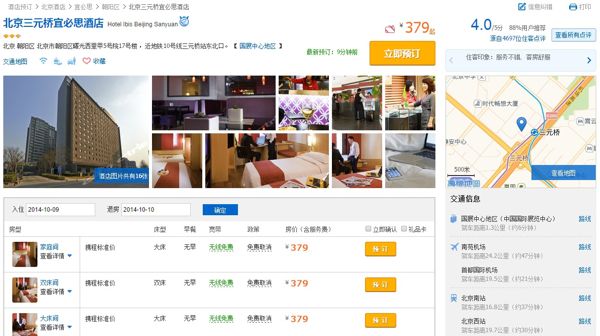There are four key channels consumers use when searching for and booking hotels online. These four major online channelsare:
- Search engines
- Comparison websites
- Hotel booking engine websites
- Hotel chain/brand websites
Unless a hotel booking engine website has a stronger brand value than that of major competitors – where the majority of Web traffic will be direct traffic – the most effective channel for generating optimum traffic is from search engines.
Here is a checklist for hotel marketers looking to maximize hotel bookings in multiple Asian markets (including China) from search marketing.
Search Engine Optimization
- Always check pages are being indexed by Google and Baidu (or the major search engine of your market)
- Identify and optimize the content of the top 100 pages in terms of the highest Google and Baidu organic search traffic from a Web analytics program (e.g. Google Analytics) and review and optimize the internal linking structure of the top 100 pages with the highest Google and Baidu organic search traffic
- Also identify the top 100 pages in terms of highest organic search impressions from Google Webmaster Tools reports Review and improve the page title tag, H1 tag, and the META description content of the top 100 pages in terms of highest Google and Baidu organic search impressions
- Check the content of the top 100 pages against the content of your other pages in order to eliminate possible duplicate content issues
- Examine page URL structure, especially for URLs that may cause duplicate content issues
- Regularly review suspicious inbound links from Google Webmaster Tools reports and Baidu Webmaster Tools reports
Paid Search
In paid search accounts, including Google AdWords, Baidu Tuiguang, Bing Ads, and any other local specific search engine accounts, ensure all brand keywords and brand variation keywords are covered, and are all pointing to your hotel booking homepage as the landing page.
Ensure all keywords (and/or all the variations) of the top 100 or even the top 1,000 destinations are covered, and pointing to the correct destination hotel search result page as landing pages.
Keywords (and/or all the variations) of the top 500 or even the top 5,000 hotel names should also be covered, and ensure they are pointing to the individual detailed hotel pages as landing pages.
See the example below:

You should also review the budget being spent on each type of keyword by reviewing the number of bookings and revenues generated from each type of keyword, and the performance of ads for each keyword.
Landing Page Optimization
A hotel booking engine website should always have three major page types and they normally serve well as landing pages for both paid search campaigns and search engine optimization campaigns:
- Homepage
- Destination hotel search results page
- Hotel individual detailed page
Ensure the main hotel content and layout of the homepage is optimized as a landing page for SEO and paid search, and do the same for destination hotel search results. This is also the time to check the main hotel content and layout of the individual detailed hotel page is optimized as a landing page for SEO and paid search.
Then:
- Optimize all the elements of the hotel search box on the homepage
- Optimize the sequence of the hotel search results for each of the top 100 (or even top 1,000) destinations for the destination hotel search results page
- Adapt a responsive design for the homepage, hotel search results, and individual detailed hotel page for mobile device users Check the loading speed of the homepage, the destination hotel search results pages, and the hotel individual detailed pages
Data Reports and Analysis
In order to understand the behavior of website users, examine the data of paid search traffic and organic search traffic against hotel booking engine websites. I will expand on this in a later column, but in short, a good checklist is as follows:
- Review the ratio of conversions of different device types (i.e. desktop/PC, tablet, and mobile) from paid search traffic
- Review the bounce rate metric and the time on-site metric of both paid search traffic and organic search traffic
- Review the ratio of new versus returning users of both paid search traffic and organic search traffic
- Review the frequency of both paid search traffic and organic search traffic
- Review the goal funnel reports for both paid search traffic and organic search traffic
- Review goal flow reports for both paid search traffic and organic search traffic
- Review goal flow by location (i.e. country and/or city) for both paid search traffic and organic search traffic
- Review the click and conversion attribution models of paid search traffic in order to maximize the output of paid search marketing budgets
- Review the multi-channel funnel data of both paid search traffic and organic search traffic within all traffic sources
- For the China market, setup Baidu’s Analytics tool on your website and integrate it with your Baidu paid search account
